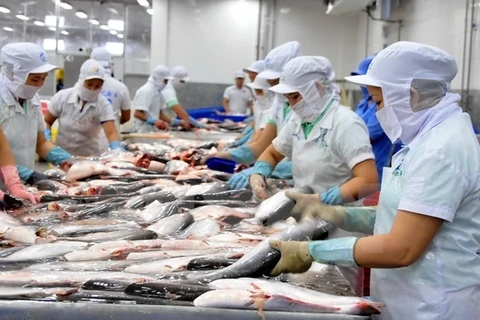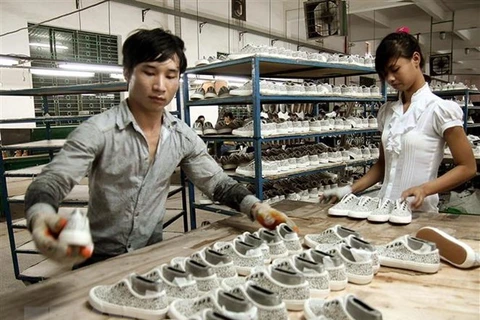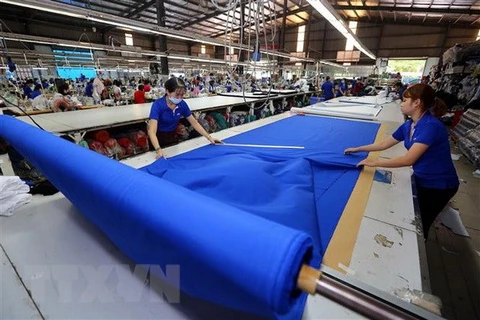Hanoi (VNA) – The Comprehensive and Progressive Agreement for Trans-Pacific Partnership (CPTPP) officially came into force in Vietnam on January 14, promising to open up opportunities for many industries to boost exports, but also posing challenges for businesses which require them to devise long-term strategies to increase their competitiveness in the global market.
With 11 member countries, the CPTPP accounts for 13.4 percent of the global GDP and will be the third biggest economic bloc in the world, only after the North American Free Trade Agreement (NAFTA) and the European Union (EU).
In terms of commitment, the CPTPP has been evaluated by experts as the most forward-thinking and wide-ranging cooperation agreement at this time.
Le Dang Doanh, a member of the UN Committee for Development Policy, said the CPTPP is a new stride for Vietnam in international economic integration.
The participation in the deal will help Vietnam multilateralise its economic and trade relations, and avoid risks from being too dependent on several major markets.
Tran Quoc Khanh, Deputy Minister of Industry and Trade, said the CPTPP will create opportunities for wood and timber product exporters.
Vice Chairman of the Vietnam Leather, Footwear, and Handbag Association (LEFASO) Diep Thanh Kiet said the deal as well as as other new-generation free trade agreements not only create advantages in tariff preferences, but also greatly benefit the Vietnamese economy in general, and its leather and footwear industry in particular, by promoting institutional reforms to boost business development.
For their part, Vietnamese firms have been accelerating preparations to optimise opportunities to expand exports.
Tran Huu Phuoc, Finance Director of Tran Hiep Thanh Textile JSC, said his firm is building a garment-textile factory worth around 1 trillion VND (42.9 million USD).
Pham Xuan Hong, Chairman of the Ho Chi Minh City Association of Garments and Textiles, Embroidery, and Knitwear, said Vietnamese garment-textile products that meet CPTPP technical standards will enjoy zero percent tariff.
Businesses in the association are pushing ahead with human resources training and technological reforms to maximise on opportunities from the pact. They are also opening training courses for workers to better meet requirements on the quality of products in the upcoming orders, Hong added.
Nguyen Van Thoi, Chairman of TNG Investment and Trade JSC - the biggest garment-textile company in the northern province of Thai Nguyen – said that his firm started preparations to meet CPTPP standards five years ago, meaning it now stands ready to ensure the majority of the deal’s requirements.
The company also mapped out plans to shift to importing materials from intra-bloc countries and build its own material production plant instead of importing from countries that do not enjoy CPTPP incentives.
Alongside the business community, multiple localities have also made essential preparations to effectively implement the agreement.
Vice Chairman of the People’s Committee of northern Vinh Phuc province Le Duy Thanh said his province has built resolutions and put forth solutions to support businesses and create the optimal environment for businesses.
Nguyen Thi Thu Trang, Director of the WTO Integration Centre under the Vietnam Chamber of Commerce and Industry (VCCI), suggested the Government, ministries, localities, and business associations promote the provision of information on the CPTPP for businesses and individuals.
Businesses themselves should proactively seek information on commitments relevant to their sectors and most importantly focus on improving their competitiveness, she said.
Huynh Van Hanh, Vice Chairman of the Handicraft and Wood Industry Association of Ho Chi Minh City, said that besides meeting requirements on the origin of products and social responsibility, businesses should also be ready for competition with foreign investors.
The Government is scheduled to promulgate an action programme for the smooth and effective enforcement of the deal.
Businesses should exert more efforts to turn challenges into motivations in reforming technologies, reducing production costs, and increasing the quality of products and their competitive edge, all as a means to expanding cooperation with foreign partners to get deeper involved in the global supply chain.
Earlier, the CPTPP officially came into force on December 30, 2018 in Mexico, Japan, Singapore, New Zealand, Canada, and Australia, the first six countries to ratify the pact.
The pact was signed by 11 member states, namely Australia, Brunei, Canada, Chile, Japan, Malaysia, Mexico, New Zealand, Peru, Singapore, and Vietnam in March 2018.–VNA
VNA
























